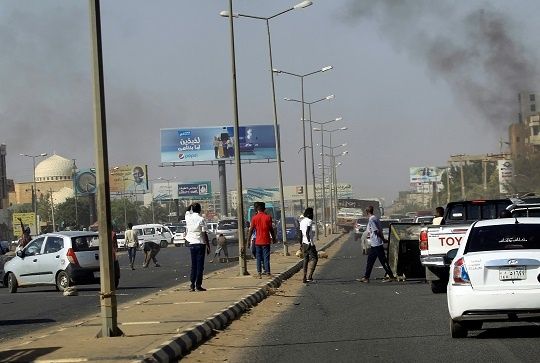It's a dramatic shift from al-Bashir's previous demand for the "rats to go back to their holes."
As near-daily protests continue against the Sudanese government, President Omar al-Bashir has taken a different, more concillatory tone with the protesters Wednesday, saying that the majority are young with poor prospects, and pledged to release detained journalists.
RELATED:
Sudanese Security Forces Use Tear Gas to Disperse Protesters
Bashir's remarks seemed to signal a new strategy to soften the government's stance toward protests after the Defense Minister and Prime Minister made similar remarks in recent days.
"Most of the protesters are young and there are factors that drove them to take to the streets, including inflation, which led to higher prices - and the limited job opportunities that don't match the number of graduates," al-Bashir told journalists who had been invited to the presidential palace for a "discussion of recent events," Reuters reported.
The remarks are a dramatic shift from al-Bashir's previous demand for the "rats to go back to their holes."
He also said young people's anger was fueled by the "wrong implementation" of Sudan's public order laws. Morality laws, for instance, have been criticized by human rights organizations for restricting the freedom of women by, for example, making it a crime for a woman to wear trousers.
RELATED:
Sudan: Protests Continue Following Promise to Free Detainees
Students, activists and other protesters frustrated with economic hardships have held almost daily demonstrations across Sudan since Dec. 19, mounting the most sustained challenge to President Omar al-Bashir's three decades in power. The protests were initially sparked by price increases, limits on cash withdrawals and other economic hardships.
Police officers have used tear gas and occasionally live bullets to disperse the demonstrations. Human rights activists say at least 45 have been killed, though the government marks the death toll at 30, including two security personnel.
In all of this, political activists, civil society members and journalists have been detained. Al-Bashir said all journalists who have been jailed in connection with the protests would be released. Activists estimate that 16 journalists have been imprisoned.
Defense Minister Awad Mohamed Ahmed Ibn Auf did not directly address the protesters' concerns, but said the youth had "reasonable ambition," and that the situation in the country showed a schism between young and old.

That division, he said, "requires intergenerational communication and fair solutions to youth problems and realizing their reasonable ambition."
The president has warned against destabilizing the Sudanese state, saying "you can look at what happened in Libya," which has been in a state of turmoil since a 2011 civil war led to the overthrow of former ruler Muammar Gaddafi.
Al-Bashir is wanted by the International Criminal Court over charges of masterminding a genocide in the Darfur region, which he denies. He has been lobbying to be removed from a list of countries that Washington considers state sponsors of terrorism.
The listing has blocked the investment and financial aid that Sudan was hoping for when the United States lifted sanctions in 2017, economists say. Sudan has been rapidly expanding its money supply in an attempt to finance its budget deficit, causing spiraling inflation and a steep decline in the value of its currency.